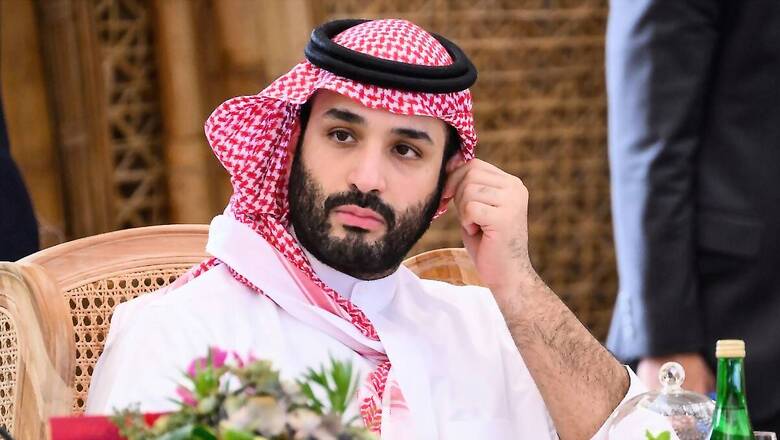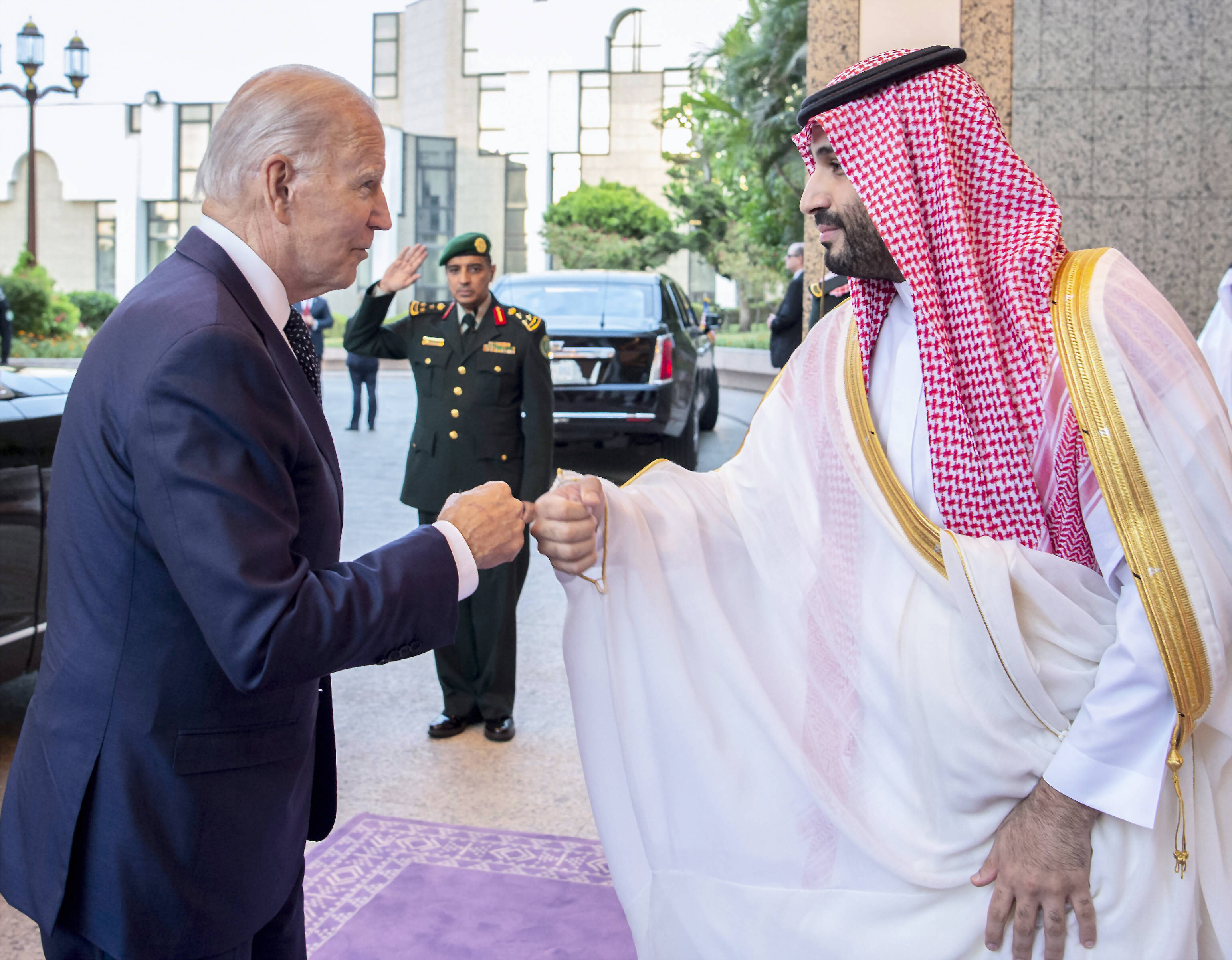
views
In September last year, 10 prisoners from Morocco, the United States (US), the United Kingdom (UK), Sweden and Croatia made a brief stopover in Jeddah before heading to their respective countries. They were captured by the Russian forces while fighting on the Ukrainian side and were released into Saudi custody because of personal intercession by Mohammed bin Salman, the crown prince of Saudi Arabia and its de facto ruler.
That episode, where Saudi goodwill ensured a brief interlude of compromise amid bitter combat, presaged what has become a much more public effort by the kingdom to bring an end to the bloodiest conflict in Europe since World War II. This weekend, Jeddah is hosting about 40 countries, including India, but not Russia, as it mounts the first major international effort to pacify the warring sides.
Under Mohammed bin Salman, or MBS, the international profile of the oil superpower has risen so fast that Jeddah is starting to look like the new Camp David, the country retreat of the US president where world leaders parlayed and set aside their differences.
No matter which way the weekend discussions go, the Saudis have positioned themselves as an indispensable go-between on Ukraine. They are also persuading the Sudanese to stop fighting; working to get Syria back into the Arab and international fold; bringing together the rival Palestinian factions; and continuing to pacify the warring politicians in Pakistan. All this while Saudi Arabia irons out its own international relations by signing on to a China-backed rapprochement with Iran and retreating from a bloody war in Yemen.
THE MIDDLE POWER
The 37-year-old crown prince is reimagining Saudi as a middle power, if not a superpower. His goal for the next 10-20 years is clear – to become a major non-Islamic, non-oil base geopolitical power. MBS is trying to earn that position using three major aspects:
- Liberal Islam: For global acceptability, MBS is looking at liberal Islam. He wants to connect Saudi with the outside world. He doesn’t want to be restricted to the Islamic world and wants to come out of the Islamic mindset.
- Qatar model: Saudi has observed the Qatar model closely and realised that to become powerful, you have to give a platform to the world. Balancing competing trends needs courage. Saudi is displaying it by holding Iran on the one side, and Syria on the other with America and China. In between, they are also in talks with Russia.
- Renewable technologies: Saudi has a huge amount of liquidity owing to the oil money. Taking a cue from the United Arab Emirates (UAE), they are now trying to create a base for newer technologies, especially renewable, the current sentiment and biggest selling point. The aim is to become a vital part of the supply chain, which is difficult for others to dislodge.
HRH Crown Prince Mohammed Bin Salman visited the headquarters of @apple with CEO @tim_cook where he explored potential areas for partnerships and cooperation in the areas of tech, education, research and training. #CrownPrinceInSF pic.twitter.com/13lB8fSTjn— Saudi Embassy USA (@SaudiEmbassyUSA) April 7, 2018
THE ISLAMIC WORLD
The Islamic world sees four countries as important — Saudi Arabia, Turkey, Egypt and Pakistan.
Saudi Arabia draws its importance from Mecca Madina, the most important places in the religion; Turkey from the longest Caliphate seat; Egypt because of Al Azhar, one of the world’s most prestigious universities for Islamic learning, and also as the seat of Caliphate; Pakistan because of nuisance value, nuclear power and supply of trained manpower to the Islamic world and army, a case in point could be Raheel Sharif, who was appointed as the commander-in-chief of the Islamic Military Counter Terrorism Coalition, a 41-nation alliance of Muslim countries headquartered in Riyadh, Saudi Arabia, after his retirement as Pakistan’s army chief.
Yemen, Bahrain, Qatar as well as the UAE have appointed former Pakistan army personnels to key positions in their Army, Air force and Navy, which ensures deep connections for Pakistan.
Iran, with its old Caliphate seat, Islamic power and large population, is another country with nuisance value in the Islamic world. Iran also has the support of Shia Muslims, along with good defence and nuclear power.
Egypt’s decline in power, Pakistan’s economic and political mess and Iran’s internal issues mean that Saudi’s only competition is Turkey. Both the countries have land mass and population, like Qatar and the UAE don’t. However, Saudi has the economic advantage.
BECOMING THE ‘TALKING’ POINT
Holding the Ukraine talks, similar to the meeting in Copenhagen in June, is an image-building exercise, in line with the Qatar model. The conference is a win-win with no stakes — all Saudi is doing is hosting and taking ownership by issuing a press release. In return, the country will get publicity, become a stakeholder, get validity for being a responsible country that intervened in global issues, and will come closer to the US and Europe.
A similar attempt was made in Afghanistan, too, but it didn’t materialise because the US was keen on Qatar. Initial talks started with Saudi, but Doha took the lead.
Ukraine is a golden opportunity for Saudi, and the talks mediated by Saudi also suit America, one of the parties in the issue. America, which has withdrawn its troops from the region and is facing its domestic issues, was hesitant. However, Saudi has both the space and willingness and an opportunity to reduce the strain over the 2018 killing and dismemberment of Washington Post columnist Jamal Khashoggi at the Saudi Consulate in Istanbul, which the US intelligence agencies assess that Prince Mohammed had ordered. Although Biden had visited Saudi Arabia in July 2022, it wasn’t much of a success, as Riyadh did not accept his request to reduce oil prices and continued its partnership with Russia in OPEC+.

The earlier Saudi leaders were hesitant to mediate in political matters to keep their people in the dark about politics. Another worry was their validity as a democratic country, as they, too, were involved in issues related to democracy or area occupation in the past.
However, MBS is not shying away from taking positions.
THE NEW FOREIGN POLICY
As part of its diplomacy, their first such attempt came in 2007, when Pakistan’s Nawaz Sharif was kept in Saroor Palace in Jeddah. He was sent back with two bullet-proof Mercedes and Pervez Musharraf was told to give him a safe passage.
The new foreign policy has only seen the efforts being scaled up in the recent past.
Saudi encouraged Indo-Pak talks in 2021. MBS has also sought to reach a détente with Iran and push for peace in the kingdom’s years-long war in Yemen.
In May 2023, the kingdom hosted Zelenskyy at an Arab summit, also in Jeddah, while the Saudis continued to cooperate with Russia in the oil market. MBS was in France to participate in the Summit for a New Global Financial Pact in Paris in June. The same month US Secretary of State Antony Blinken and Venezuela’s President Nicolas Maduro, too, were in Riyadh. The country also recently hosted an Arab-China business conference.
It is always a delight to meet His Royal Highness Prince Mohammed bin Salman bin Abdulaziz. His vision for Saudi Arabia is remarkable. We had an extensive meeting during which we discussed numerous issues. Stronger friendship between our nations augurs well for our people. pic.twitter.com/33qiXnV7H7— Narendra Modi (@narendramodi) October 29, 2019
A couple of months ago, MBS had a telephonic conversation with India’s Prime Minister Narendra Modi on bilateral cooperation and strategic partnership, where Modi thanked MBS for Saudi Arabia’s excellent support during evacuation of Indian nationals from Sudan via Jeddah in April 2023. MBS assured full support to India’s G20 presidency.
MBS has been invited to the UK on an official visit, the first such visit by the heir to the Saudi throne since the Khashoggi fallout. Recently, MBS spoke to Italian Prime Minister Giorgia Meloni and discussed bilateral ties and issues of common concern. In May 2022, Turkish President Recep Tayyip Erdogan embraced Crown Prince Mohammed bin Salman before a state dinner and direct talks. Recently, Erdogan gifted his country’s first domestic electric vehicle to MBS.
Met with Crown Prince Mohammed bin Salman to discuss our shared priorities, including countering terrorism through the D-ISIS Coalition, achieving peace in Yemen, and deepening economic and scientific cooperation. pic.twitter.com/nmNJqgBMuG— Secretary Antony Blinken (@SecBlinken) June 7, 2023
Saudi officials see the Ukraine talks as an evidence of its global clout and vindication of its emphasis on diversifying diplomatic partners. “These talks are a prime example of the success of Saudi Arabia’s multipolar strategy of maintaining strong ties to Ukraine, Russia and China," said Ali Shihabi, a Saudi analyst close to the government.
“Moving forward, Riyadh wants to be in the company of an India or a Brazil, because only as a club can these middle powers hope to have impact on the world stage," said Joost Hiltermann, Middle East programme director for the International Crisis Group.
“Whether they will be able to agree on all things, such as the Ukraine war, however, is a big question."















Comments
0 comment